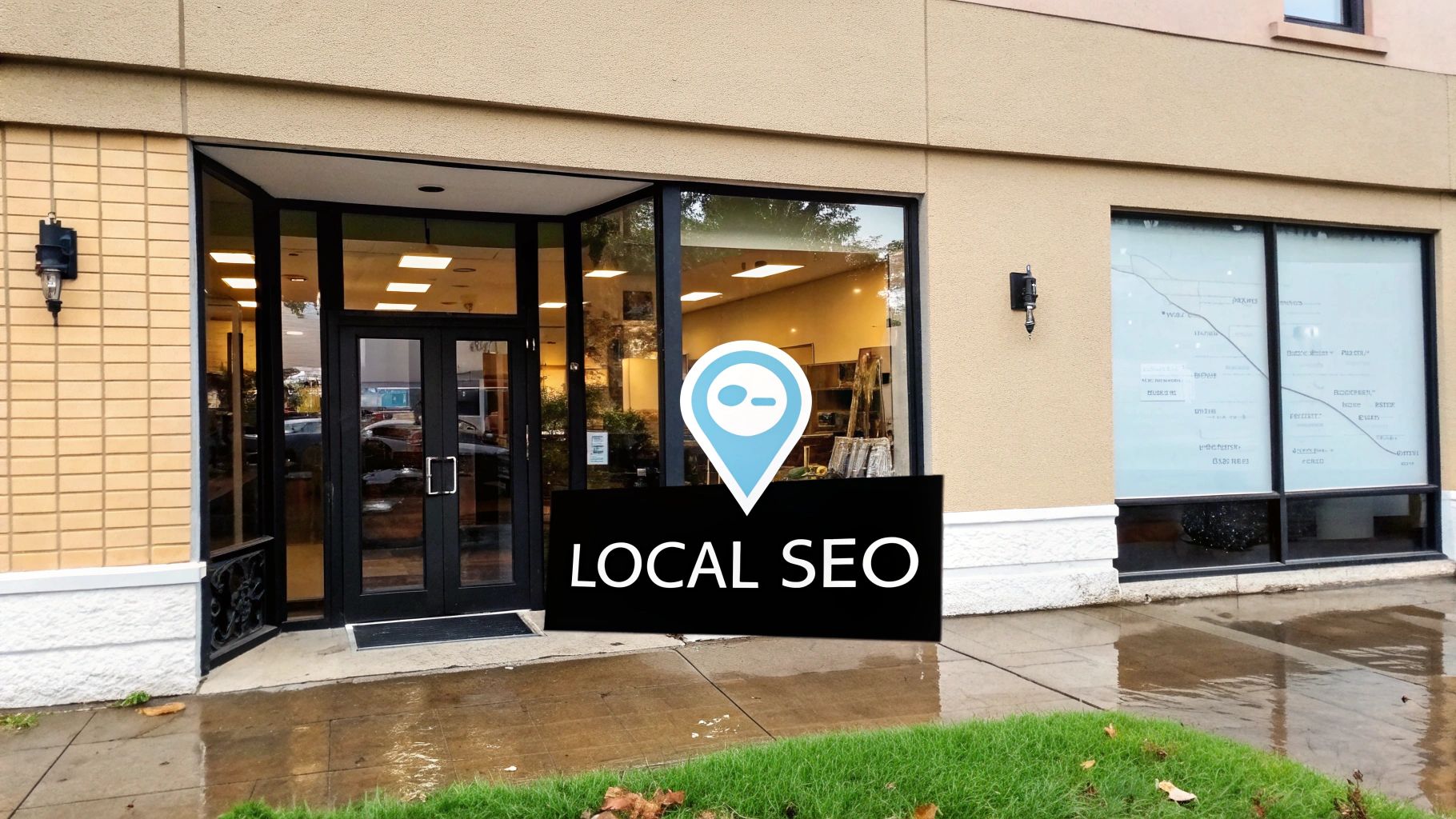Choosing a water damage SEO company isn't like hiring any old marketing firm. You need a partner who understands the urgency of your business. A general marketer might not get the difference between a casual search and a frantic 3 AM call about a flooded basement. A specialist lives for those calls.
They know that when a pipe bursts, every second you're not on the first page of Google is a job lost to a competitor. This is where finding the right SEO partner is critical.
Why a Specialist SEO Partner Is a Game Changer
Let's be clear. Most marketing agencies talk about long-term brand building and content calendars. That’s fine, but it doesn’t help the homeowner standing in an inch of water, Googling “emergency flood cleanup near me.”
A specialist operates with the same urgency you do. They understand your business model is built on immediate response.
They Understand Your Customer's Mindset
A generalist agency sees keywords. A specialist sees the panic behind the search. They know your customer isn't just browsing—they're in a crisis and need help now.
This insight shapes everything they do:
- Smarter Keyword Targeting: They move beyond basic terms like "water damage." They target high-intent keywords like "sewage backup cleanup" or "24/7 burst pipe repair."
- Urgency-Driven Ads: Their ad copy speaks directly to the emergency, highlighting 24/7 availability and rapid response times.
- Conversion-Focused Design: Your website isn't just for looks. They make sure the "Call Now" button is big, obvious, and easy to find.
They Master Local, Hyper-Targeted Search
Water damage is a local problem. A homeowner in one town doesn't care about a restoration company two counties over. A specialist focuses on making you the top choice in your service area.
For any restoration business, learning how to rank on Google Maps and win local search is crucial. It’s how you capture those "near me" searches that turn into jobs.
To give you a clearer picture, let's break down the difference.
Generalist SEO vs. Specialist Water Damage SEO
It’s easy to think all SEO is the same, but the focus is completely different. Here's a quick comparison:
| Feature | Generalist SEO Agency | Specialist Water Damage SEO Company |
|---|---|---|
| Keyword Strategy | Targets broad terms like "home repair." | Focuses on emergency keywords like "frozen pipe water damage" or "sump pump failure cleanup." |
| Content Approach | Writes generic posts like "5 Spring Cleaning Tips." | Creates content like "What to Do Immediately After a Kitchen Flood" to capture panicked searchers. |
| Website Focus | Aims for a nice design and brand awareness. | Optimizes for one thing: getting the phone to ring. Big "Call Now" buttons are key. |
| Local SEO Priority | Treats Google Maps as a checklist item. | Views Google Maps as the #1 priority for driving emergency calls. |
| Success Metric | Reports on traffic and rankings. | Reports on what matters: qualified phone calls and booked jobs. |
The takeaway is simple: a generalist might get you more website visitors, but a specialist gets you more customers.
In Short: A specialist firm's deep industry knowledge translates directly into more emergency calls and a better return on your marketing investment. Their expertise delivers what actually keeps your crews busy: profitable jobs. For a deeper dive, check out this guide on SEO for restoration companies.
What Does Winning Actually Look Like for Your Business?
Before you search for a water damage SEO company, you need to define your goals. Just saying you want "more traffic" isn't enough. You need to be specific about what will actually move the needle for your business.
Think about what a "win" really means. Is it the phone ringing constantly? Owning the map in your service area? Landing more high-ticket commercial jobs? Getting clear on this helps you find an agency that gets you.
Let's Get Specific with Your Goals
Vague goals lead to vague results. It’s time to set real-world business objectives. When you have clear targets, you can easily review proposals and measure an agency's performance.
Instead of saying "I need more leads," try this:
- "My goal is to get 20 qualified water mitigation leads each month from our main service area."
- "We need to boost our calls for commercial drying services by 30% in the next six months."
- "I want to dominate the Google Map Pack for 'emergency flood cleanup' in my top three zip codes."
See the difference? When you're specific, you can measure your return on investment. If you spend $3,000 a month on SEO, you’ll know exactly what you need back to make it worthwhile.

Key Questions to Figure Out Your Target
Answering these questions now will save you headaches later. Any SEO partner worth hiring will need this info to build a strategy that works.
- Who is your ideal customer? Are you targeting residential homeowners or commercial property managers? The marketing strategy for each is different.
- Where do you make the most profit? Are your mold remediation jobs more profitable than simple water extractions? Focus the SEO efforts where they’ll have the biggest impact.
- What is a realistic budget? Knowing your budget helps you filter out agencies that are too cheap to be effective or too expensive for your current stage.
A top-notch water damage SEO company won't just take your money. They'll start by asking you these same questions. If an agency talks about keywords before understanding your business, that’s a big red flag. Your goals must come first.
Seeing Past the Sales Pitch: How to Really Vet an SEO Agency
Every SEO agency will show you a slick presentation full of jargon and charts. Your job is to cut through the noise and find out one thing: can they make your phone ring with profitable jobs?
Forget about fancy graphs showing "more traffic." You need proof that they've delivered real customers to another restoration company like yours. A legitimate water damage SEO company will be proud to show you their work.
Demand Proof, Not Promises
Talk is cheap. Stop listening to what an agency says they can do and demand they show you what they've already done.
Here’s what you should ask for:
- Verifiable Case Studies: Ask to see case studies from other water damage or home service clients. Look for specifics—real numbers on lead growth and call volume increases.
- Client References: A confident agency will have a list of happy clients. Ask if you can speak with one (in a different city, of course).
- Live Examples: This is important. Ask them to show you a current client's Google Business Profile. Is it active? Are they managing reviews? Do you see recent project photos?
Try asking this question: "Can you show me the lead growth you achieved for a restoration client in a market as competitive as mine?" Their answer will tell you everything.
Sharp Questions to Separate the Pros from the Pretenders
Your goal is to test their real-world knowledge. A true specialist understands the restoration business.
Throw these questions at them:
- How would you target different emergency services, like sewage cleanup versus storm damage?
- What is your plan for our Google Business Profile when a major storm hits our area?
- How do you build local trust and earn backlinks for a company like mine?
- How do you measure success beyond just traffic? What metrics will be on our monthly report?
The restoration industry is growing. Find out more about the 2024 restoration industry trends. This growth means more competition, making a smart SEO strategy essential.
It's also worth looking at how they run their own business. Understanding their use of marketing automation strategies for agencies can show how organized they are.
Key Takeaway: A true expert will give you confident, detailed answers. A generalist will give you vague, textbook responses. Listen closely.
Major Red Flags to Watch Out For
Sometimes, the warning signs are what an agency doesn't say.
- Guaranteed #1 Rankings: This is a huge red flag. Nobody can guarantee a specific spot on Google. Anyone who does is likely using shady tactics that can get you penalized.
- Vague Reports: If their reports are full of "vanity metrics" like impressions but don't connect to your bottom line, walk away. You need to see calls, leads, and jobs.
- A "One-Size-Fits-All" Strategy: If they present a generic plan before asking about your business goals, they're not a partner; they're just selling a package.
And don't forget to Google their company's reviews. What are their own clients saying?

As you can see, reviews are everything. Your SEO partner should have a stellar reputation.
It's also a good idea to understand all your marketing options. Many owners weigh paid ads against organic search; you can learn more about PPC vs. SEO for restoration services here.
Making Sense of Proposals and Pricing
You’ve talked to a few agencies and now have several proposals. Every proposal from a potential water damage SEO company will have technical jargon, different pricing, and big promises.
Your goal is to find the partner who will make your phone ring, not just the one with the lowest price. A cheap SEO plan that brings in zero calls is a waste of money.
Decoding the Marketing Jargon
Let's translate some common terms so you know what you’re paying for.
-
On-Page Optimization: This is work on your actual website. It's making sure your page titles say things like "24/7 Flood Cleanup in Atlanta" instead of "Our Services." It also covers making your site load fast and look good on a smartphone.
-
Local Citation Building: This means getting your business listed correctly in online directories like Yelp and Angi. Your business name, address, and phone number need to be identical everywhere to build trust with Google.
-
Content Marketing: This is about creating useful content that answers customer questions. A blog post like "What to Do Immediately After Your Basement Floods" can catch people right when they need you and position you as an expert.
Good content is critical. It's not just blog posts; it's about creating resources that genuinely help people.
As you can see, informational blog content often drives valuable leads because it directly solves a problem.
Understanding Common Pricing Models
SEO agencies charge in different ways. Here are the main models you'll see:
-
Monthly Retainer: This is the most common. You pay a set fee each month for a list of services. It's predictable for your budget. The downside? You pay the same whether you get 5 leads or 50.
-
Performance-Based Fees: You pay for results, like a fee for every qualified phone call. This lowers your upfront risk, but the cost per lead can be higher.
-
Project-Based Pricing: This is for one-off jobs, like a website redesign or an initial local SEO setup. You pay a single price for a clearly defined project.
SEO Proposal Comparison Checklist
Use this checklist to compare proposals side-by-side. It helps you look beyond the price tag.
| Evaluation Criteria | Company A | Company B | Company C |
|---|---|---|---|
| Clear Goals & KPIs | |||
| Detailed Strategy | |||
| Scope of Services | |||
| Pricing Model | |||
| Contract Terms | |||
| Team Experience | |||
| Reporting & Comms | |||
| Case Studies |
Once you’ve filled this out, the best choice often becomes much clearer.
Starting Strong: Your First 90 Days
You’ve signed with your new water damage SEO company. What happens now? The first three months are about laying a solid foundation for future growth.
It starts with a deep-dive discovery call. This is a strategy session. They should ask about your most profitable services, your service area, and your local competitors. Share your on-the-ground insights—they are gold for their strategy.

Getting the House in Order
The first few weeks are for setup and technical work. Your new partner will be digging into your website and installing tracking tools.
Here’s a look at the essential setup tasks:
- Analytics & Call Tracking: They'll set up Google Analytics and call tracking so you can see exactly where every lead comes from.
- Google Business Profile Overhaul: They should take control of your GBP, clean up any inaccurate info, and optimize it for local SEO.
- Full Website Audit: They'll perform a technical audit of your site to find and fix hidden issues hurting your rankings.
This foundational work is everything. For a deeper look, check out this water damage contractors marketing plan.
What to Realistically Expect (and When)
SEO is a marathon, not a sprint. The first 90 days are about building momentum.
The water damage restoration market is exploding, projected to jump from $13.8 billion in 2024 to over $22.6 billion by 2030. This growth means more competition, which makes a patient, strategic SEO plan more critical than ever. You can read more on this growing market here.
Here’s a realistic timeline:
- Month 1 (Days 0-30): All about groundwork. Expect a lot of behind-the-scenes activity—technical fixes, keyword mapping, and competitor analysis.
- Month 2 (Days 31-60): You might start seeing early results, like your business moving up in the local map pack for some keywords.
- Month 3 (Days 61-90): The ball should be rolling. You might notice an uptick in organic traffic and more quality calls from your website and GBP.
By the end of this period, you should have access to a clear reporting dashboard and feel confident about the strategy.
People Also Ask: Top Questions About Restoration SEO
Restoration owners often ask the same questions about SEO. Here are some straight answers based on years of experience.
How do I choose an SEO company for my restoration business?
Look for a specialist, not a generalist. Choose a water damage SEO company with proven case studies from other restoration businesses. Ask for client references and demand to see live examples of their work, like their clients' rankings on Google Maps.
How much should I pay for restoration SEO?
For a serious campaign with an agency that knows the restoration industry, expect to invest between $2,000 and $6,000+ per month. The cost depends on your city's size and competition. Be wary of cheap offers; they often cut corners on quality.
How long does it take for SEO to work for water damage companies?
SEO is a long game. You might see some movement in local map rankings within 3 to 4 months, but it usually takes 6 to 12 months of consistent work to get a steady flow of organic jobs. The timeline depends on your local market and your website's starting point.
Which is better for generating leads: Google Ads or SEO?
The best answer is "both." They work well together.
- Google Ads gets your phone ringing immediately, which is crucial for an emergency service.
- SEO builds long-term trust and a sustainable pipeline of high-quality leads that you don't have to pay for per click.
A smart approach is to run Google Ads for immediate calls while your SEO campaign builds momentum.
Ready to stop guessing and start getting the emergency calls you need to grow? At Clicks Geek, we specialize in turning your website into a lead-generating machine for restoration contractors. Let's talk about a real-world strategy for your company.
Is Your Business Ranking in Google Maps?
Turn Google Maps into a Lead Engine w/ Clicks Geek’s AI-powered local SEO. 3,000+ clients served. Our proprietary, fully done-for-you Maps SEO system handles everything—keyword targeting, local optimization, content, reviews, and ranking strategy—automatically.






